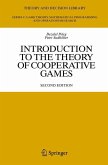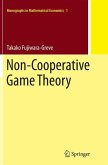This book proposes several commonly used interval-valued solution concepts of interval-valued cooperative games with transferable utility. It thoroughly investigates these solutions, thereby establishing the properties, models, methods, and applications. The first chapter proposes the interval-valued least square solutions and quadratic programming models, methods, and properties. Next, the satisfactory-degree-based non-linear programming models for computing interval-valued cores and corresponding bisection algorithm are explained. Finally, the book explores several simplification methods of interval-valued solutions: the interval-valued equal division and equal surplus division values; the interval-valued Shapley, egalitarian Shapley, and discounted Shapley values; the interval-valued solidarity and generalized solidarity values; and the interval-valued Banzhaf value.
This book is designed for individuals from different fields and disciplines, such as decision science,game theory, management science, operations research, fuzzy sets or fuzzy mathematics, applied mathematics, industrial engineering, finance, applied economics, expert system, and social economy as well as artificial intelligence. Moreover, it is suitable for teachers, postgraduates, and researchers from different disciplines: decision analysis, management, operations research, fuzzy mathematics, fuzzy system analysis, applied mathematics, systems engineering, project management, supply chain management, industrial engineering, applied economics, and hydrology and water resources.
This book is designed for individuals from different fields and disciplines, such as decision science,game theory, management science, operations research, fuzzy sets or fuzzy mathematics, applied mathematics, industrial engineering, finance, applied economics, expert system, and social economy as well as artificial intelligence. Moreover, it is suitable for teachers, postgraduates, and researchers from different disciplines: decision analysis, management, operations research, fuzzy mathematics, fuzzy system analysis, applied mathematics, systems engineering, project management, supply chain management, industrial engineering, applied economics, and hydrology and water resources.
"Through its three chapters, this book expands cooperative games, theoretically, from point-valued to interval-valued ones. ... This book presents a good example of expanding existing knowledge with interval methods in addition to many other successful applications of interval computing. ... this book can be a good reference for those who are interested in bringing interval computing as an additional tool into their computing practice in any field." (Computing Reviews, June, 2017)








